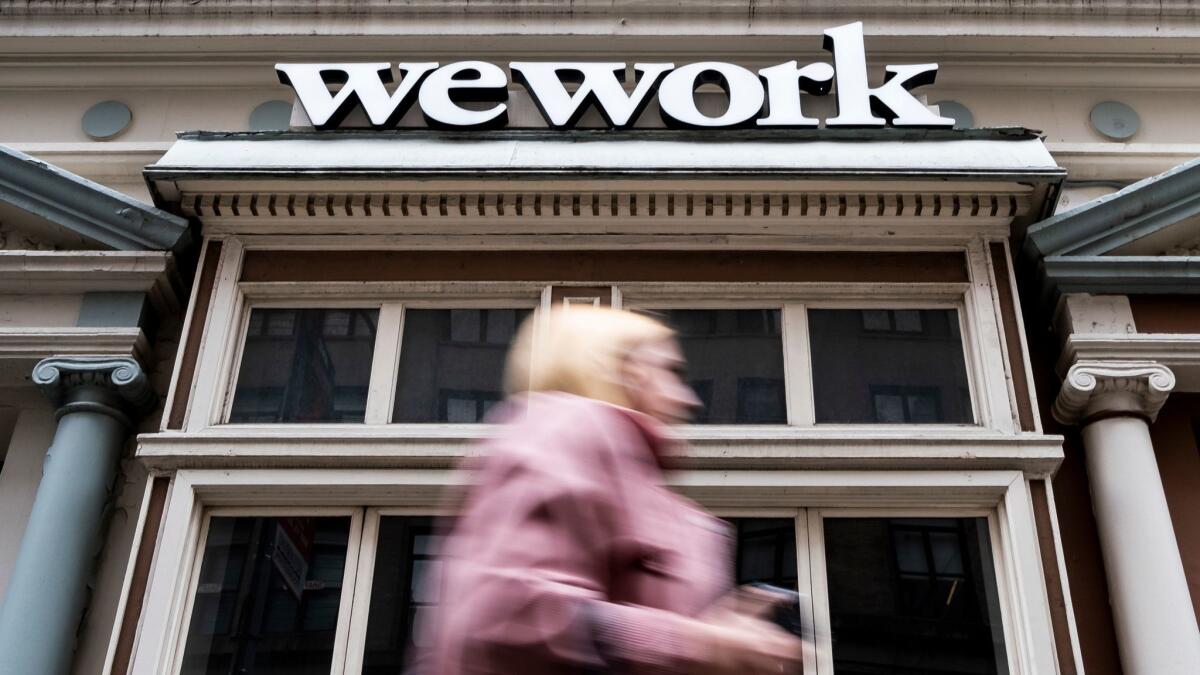WeWork considers governance changes to save IPO

- Share via
WeWork is considering major changes to governance to assuage investor concerns ahead of an initial public offering this month that has given pause even to some of its own bankers, according to people with knowledge of the situation.
Both of its lead financial advisors — JPMorgan Chase & Co. and Goldman Sachs Group Inc. — have concerns about proceeding with an IPO that could value the company as low as $15 billion, the people said, asking not to be identified because the talks are confidential. That has set off a push to make the public sale more palatable to potential investors with governance reforms.
Any decision ultimately rests with the venture’s co-founder and chief executive, Adam Neumann, who maintains voting control through a three-class share structure and has been an adamant proponent of the IPO, the people said.
The stakes are high for the money-losing venture and backers including SoftBank, its largest investor, which added to its stake in January at a $47-billion valuation. WeWork needs to raise at least $3 billion through an IPO to tap into an additional $6-billion credit line that bankers have been setting up in recent weeks. The facility requires the company to carry out its offering by Dec. 31, one of the people said.
The goal is to conclude a roadshow and price the offering before Rosh Hashana, one of the people said, effectively setting a deadline of Sept. 27. Getting it done beforehand would allow Neumann, 40, to avoid using technology and observe the holiday in compliance with Jewish orthodoxy. The company could also have to compete for investor interest with home-fitness start-up Peloton Interactive Inc., which is set to kick off its roadshow, also being led by Goldman Sachs and JPMorgan.
It’s unclear what changes WeWork may make to its governance to improve interest in its IPO. The company already has taken some steps, such as adding a woman to its board and having Neumann return $5.9 million of partnership interests initially granted to him as compensation for trademarks used in a rebranding. Yet its prospectus last month raised a variety of other concerns. Among them: The company paid Neumann rent and lent him money. There are also his voting rights over major decisions.
A spokesman for WeWork declined to comment.
“Adam’s voting control will limit the ability of other stockholders to influence corporate activities and, as a result, we may take actions that stockholders other than Adam do not view as beneficial,” the prospectus warns. WeWork’s triple-class share structure ensures Neumann has an undisputed grip on the company’s decisions. The company’s B and C class shares have 20 votes each, compared with the one-vote Class A shares.
WeWork, which owns or leases offices and then rents space to companies that typically have shorter-term needs, released a preliminary prospectus last month showing the firm had racked up billions in losses and was burning cash. It lost $690 million in this year’s first half, bringing total losses to almost $3 billion in the last three years.
The company had planned to hold a formal roadshow to promote the offering as soon as this week, Bloomberg reported last week. But scrutiny of the firm’s finances and governance, as well as broader market turmoil, has taken a toll on investor enthusiasm. Early this year, Goldman Sachs privately suggested to people close to WeWork that its valuation could rise to $65 billion after going public. Advisors estimate it may achieve less than a third of that under current conditions.
Since Thursday, WeWork executives have met in London, Boston and Toronto with investors who could potentially participate in an IPO or alternatively help provide capital privately, according to a person with knowledge of those gatherings. And in recent days, bankers handling the IPO have encouraged the company to proceed with the sale, the person said.
Meanwhile, SoftBank’s hefty investment in WeWork adds to pressure on Wall Street deal makers to ensure any public offering doesn’t go awry. SoftBank’s Vision Fund owns stakes in a vast array of technology ventures, giving the firm clout in deciding which investment banks are hired for future fundraisings. It has pressed WeWork to postpone the stock offering, according to people with knowledge of the talks.
The Vision Fund invested in WeWork at about a $20-billion valuation in early 2017, while SoftBank Group kept pouring in money. A weak IPO could hurt the value of the fund’s stake just as SoftBank tries to persuade customers to bankroll a second, $108-billion iteration of the investment vehicle.
With assistance from Bloomberg writers Liana Baker, Sonali Basak and Ellen Huet.
More to Read
Inside the business of entertainment
The Wide Shot brings you news, analysis and insights on everything from streaming wars to production — and what it all means for the future.
You may occasionally receive promotional content from the Los Angeles Times.










